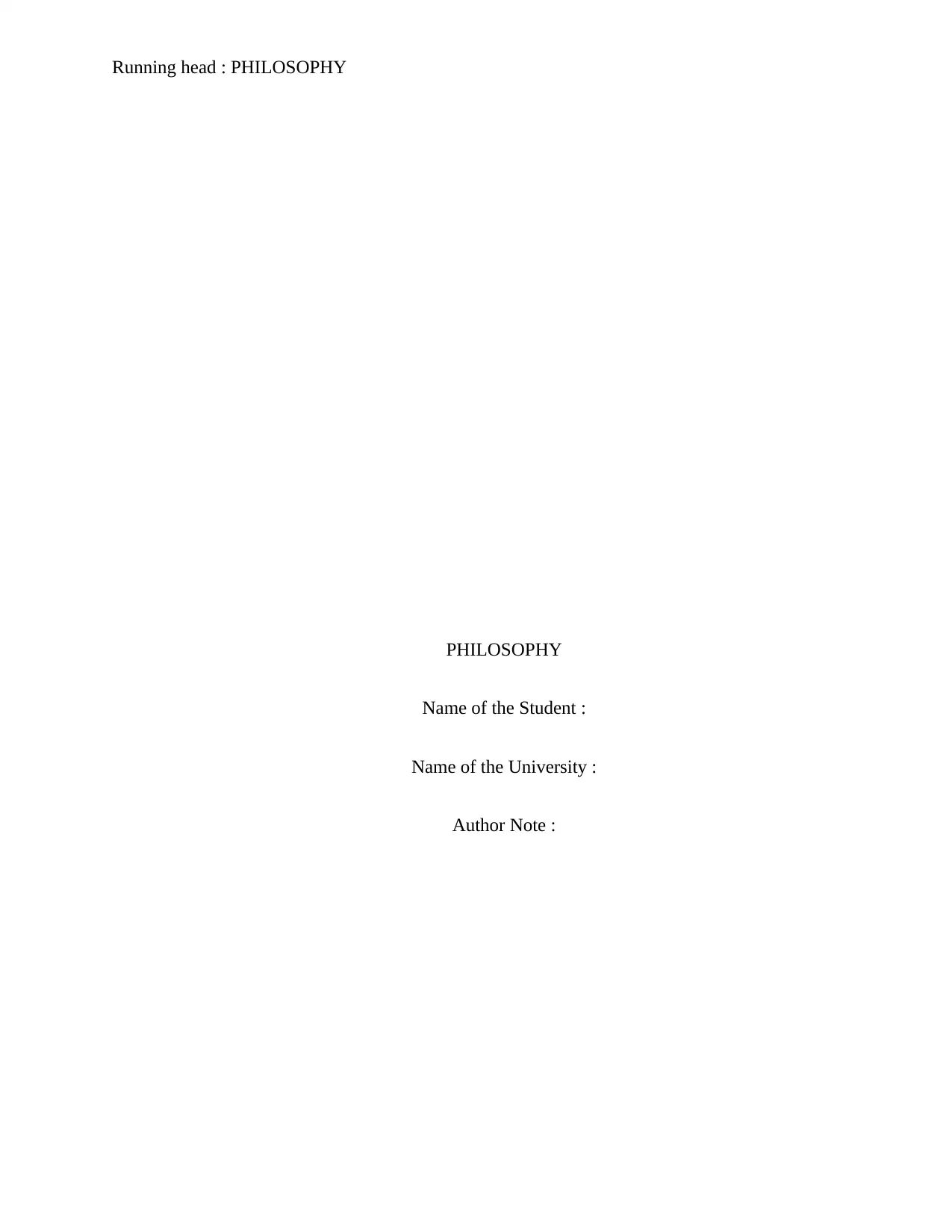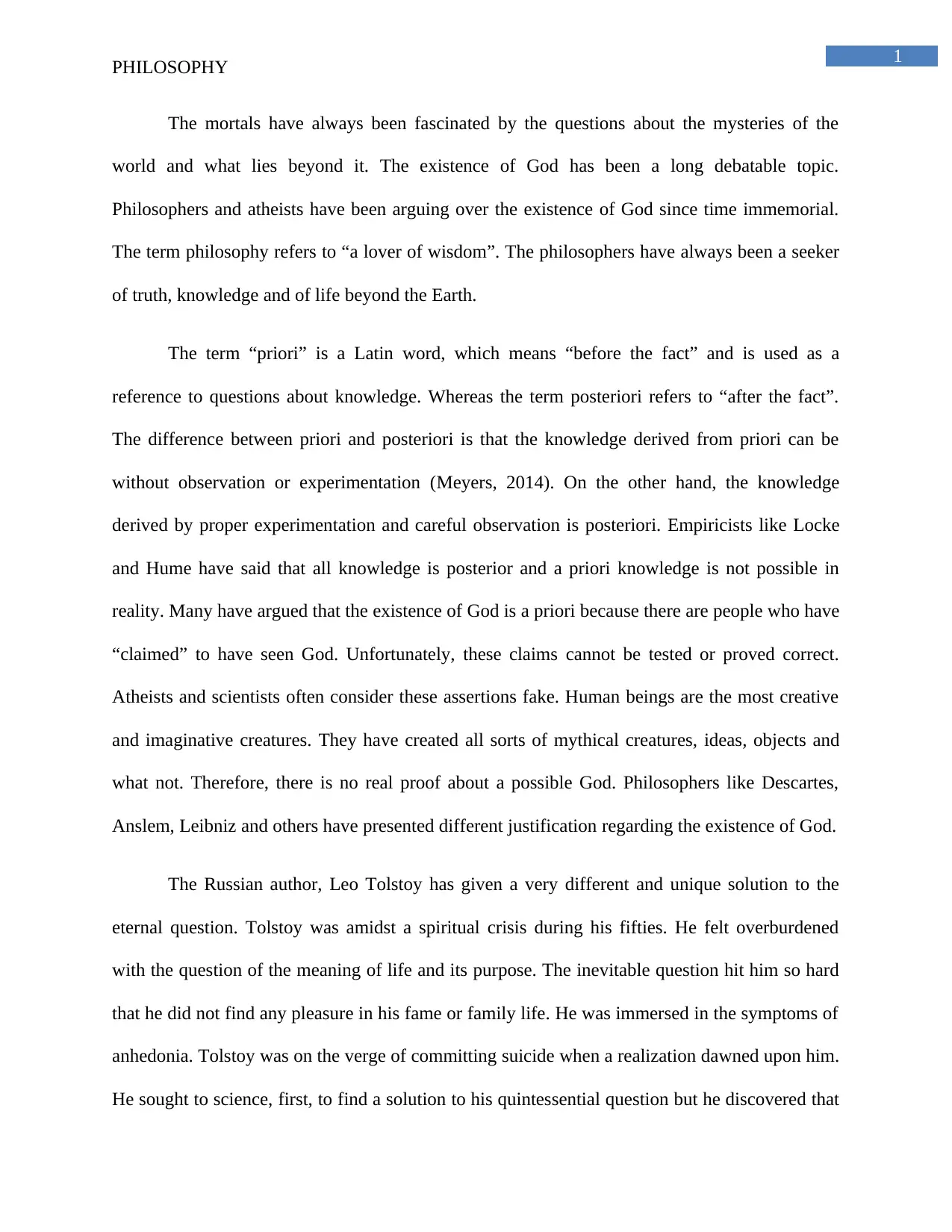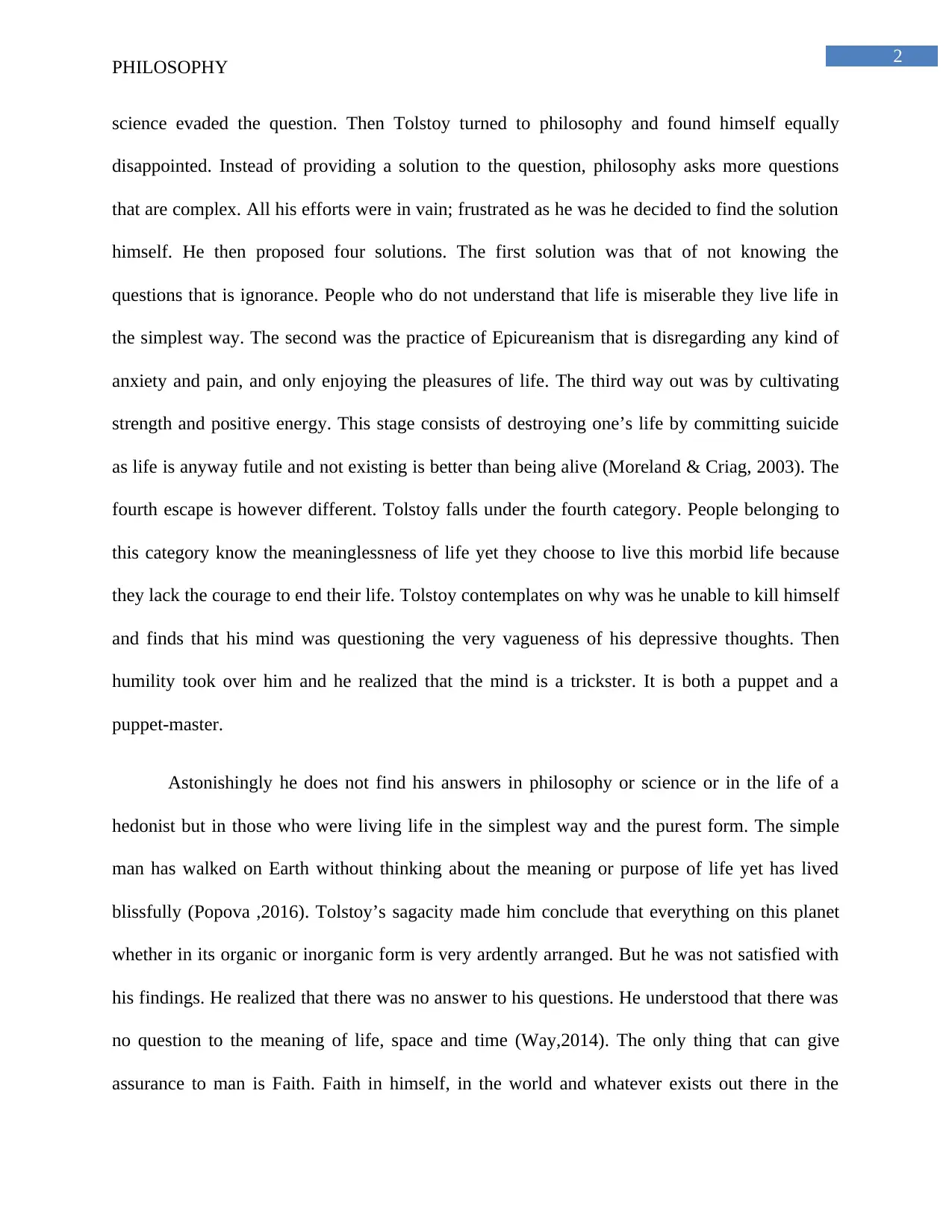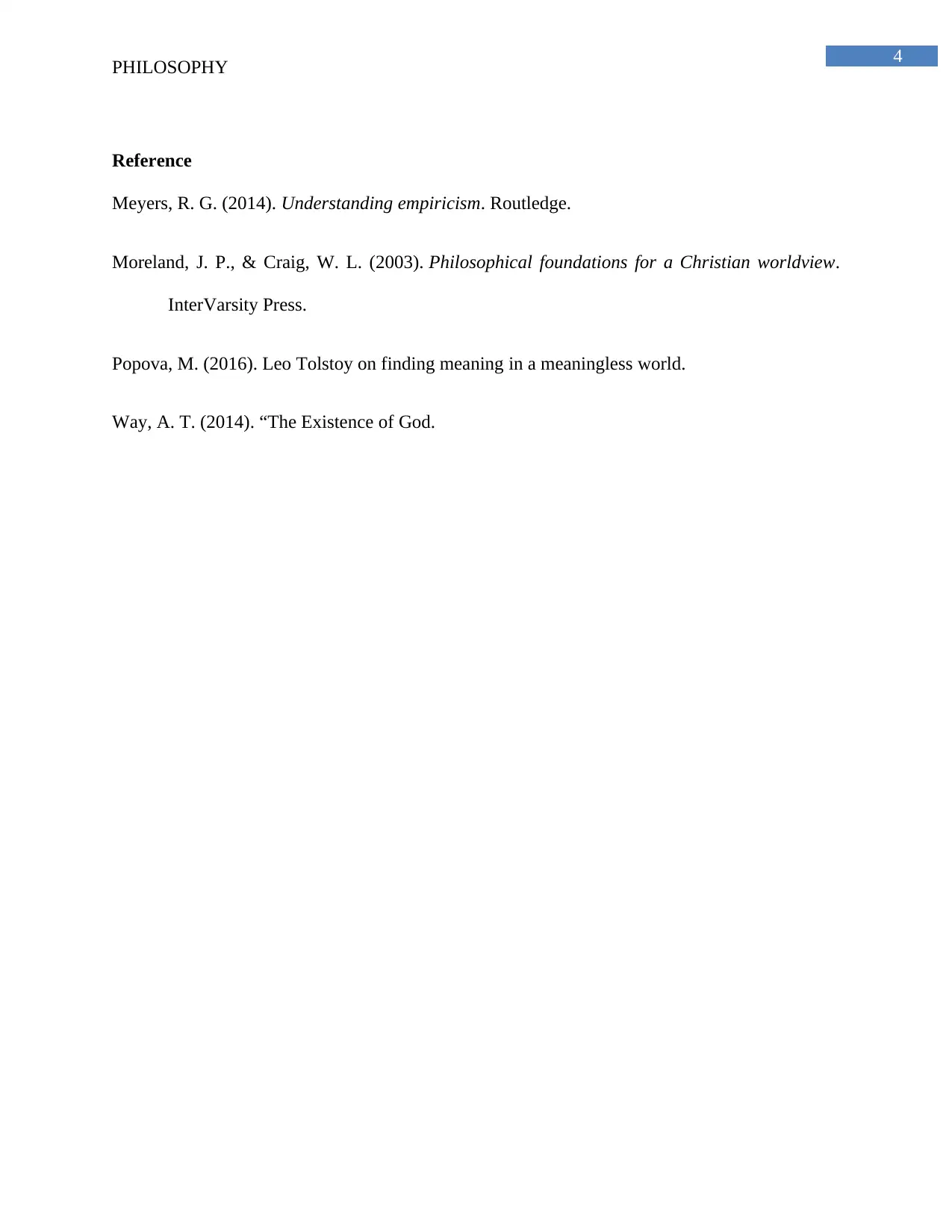Essay on Tolstoy's Perspective: Finding Meaning in a Meaningless World
VerifiedAdded on 2023/05/30
|5
|935
|268
Essay
AI Summary
This essay delves into Leo Tolstoy's exploration of the meaning of life, particularly during his spiritual crisis in his fifties. Faced with the apparent meaninglessness of existence, Tolstoy sought answers in science and philosophy, only to be disappointed. He proposed four solutions to cope with this realization: ignorance, Epicureanism, suicide, and continuing to live without meaning. Tolstoy ultimately found solace not in intellectual pursuits but in the simple faith of ordinary people. He concluded that faith provides an infinite meaning to finite existence, offering strength and resilience in the face of suffering and death. The essay examines Tolstoy's journey from despair to finding purpose through faith, highlighting his unique perspective on life's fundamental questions. Desklib offers this essay and many other resources for students.

Running head : PHILOSOPHY
PHILOSOPHY
Name of the Student :
Name of the University :
Author Note :
PHILOSOPHY
Name of the Student :
Name of the University :
Author Note :
Paraphrase This Document
Need a fresh take? Get an instant paraphrase of this document with our AI Paraphraser

1
PHILOSOPHY
The mortals have always been fascinated by the questions about the mysteries of the
world and what lies beyond it. The existence of God has been a long debatable topic.
Philosophers and atheists have been arguing over the existence of God since time immemorial.
The term philosophy refers to “a lover of wisdom”. The philosophers have always been a seeker
of truth, knowledge and of life beyond the Earth.
The term “priori” is a Latin word, which means “before the fact” and is used as a
reference to questions about knowledge. Whereas the term posteriori refers to “after the fact”.
The difference between priori and posteriori is that the knowledge derived from priori can be
without observation or experimentation (Meyers, 2014). On the other hand, the knowledge
derived by proper experimentation and careful observation is posteriori. Empiricists like Locke
and Hume have said that all knowledge is posterior and a priori knowledge is not possible in
reality. Many have argued that the existence of God is a priori because there are people who have
“claimed” to have seen God. Unfortunately, these claims cannot be tested or proved correct.
Atheists and scientists often consider these assertions fake. Human beings are the most creative
and imaginative creatures. They have created all sorts of mythical creatures, ideas, objects and
what not. Therefore, there is no real proof about a possible God. Philosophers like Descartes,
Anslem, Leibniz and others have presented different justification regarding the existence of God.
The Russian author, Leo Tolstoy has given a very different and unique solution to the
eternal question. Tolstoy was amidst a spiritual crisis during his fifties. He felt overburdened
with the question of the meaning of life and its purpose. The inevitable question hit him so hard
that he did not find any pleasure in his fame or family life. He was immersed in the symptoms of
anhedonia. Tolstoy was on the verge of committing suicide when a realization dawned upon him.
He sought to science, first, to find a solution to his quintessential question but he discovered that
PHILOSOPHY
The mortals have always been fascinated by the questions about the mysteries of the
world and what lies beyond it. The existence of God has been a long debatable topic.
Philosophers and atheists have been arguing over the existence of God since time immemorial.
The term philosophy refers to “a lover of wisdom”. The philosophers have always been a seeker
of truth, knowledge and of life beyond the Earth.
The term “priori” is a Latin word, which means “before the fact” and is used as a
reference to questions about knowledge. Whereas the term posteriori refers to “after the fact”.
The difference between priori and posteriori is that the knowledge derived from priori can be
without observation or experimentation (Meyers, 2014). On the other hand, the knowledge
derived by proper experimentation and careful observation is posteriori. Empiricists like Locke
and Hume have said that all knowledge is posterior and a priori knowledge is not possible in
reality. Many have argued that the existence of God is a priori because there are people who have
“claimed” to have seen God. Unfortunately, these claims cannot be tested or proved correct.
Atheists and scientists often consider these assertions fake. Human beings are the most creative
and imaginative creatures. They have created all sorts of mythical creatures, ideas, objects and
what not. Therefore, there is no real proof about a possible God. Philosophers like Descartes,
Anslem, Leibniz and others have presented different justification regarding the existence of God.
The Russian author, Leo Tolstoy has given a very different and unique solution to the
eternal question. Tolstoy was amidst a spiritual crisis during his fifties. He felt overburdened
with the question of the meaning of life and its purpose. The inevitable question hit him so hard
that he did not find any pleasure in his fame or family life. He was immersed in the symptoms of
anhedonia. Tolstoy was on the verge of committing suicide when a realization dawned upon him.
He sought to science, first, to find a solution to his quintessential question but he discovered that

2
PHILOSOPHY
science evaded the question. Then Tolstoy turned to philosophy and found himself equally
disappointed. Instead of providing a solution to the question, philosophy asks more questions
that are complex. All his efforts were in vain; frustrated as he was he decided to find the solution
himself. He then proposed four solutions. The first solution was that of not knowing the
questions that is ignorance. People who do not understand that life is miserable they live life in
the simplest way. The second was the practice of Epicureanism that is disregarding any kind of
anxiety and pain, and only enjoying the pleasures of life. The third way out was by cultivating
strength and positive energy. This stage consists of destroying one’s life by committing suicide
as life is anyway futile and not existing is better than being alive (Moreland & Criag, 2003). The
fourth escape is however different. Tolstoy falls under the fourth category. People belonging to
this category know the meaninglessness of life yet they choose to live this morbid life because
they lack the courage to end their life. Tolstoy contemplates on why was he unable to kill himself
and finds that his mind was questioning the very vagueness of his depressive thoughts. Then
humility took over him and he realized that the mind is a trickster. It is both a puppet and a
puppet-master.
Astonishingly he does not find his answers in philosophy or science or in the life of a
hedonist but in those who were living life in the simplest way and the purest form. The simple
man has walked on Earth without thinking about the meaning or purpose of life yet has lived
blissfully (Popova ,2016). Tolstoy’s sagacity made him conclude that everything on this planet
whether in its organic or inorganic form is very ardently arranged. But he was not satisfied with
his findings. He realized that there was no answer to his questions. He understood that there was
no question to the meaning of life, space and time (Way,2014). The only thing that can give
assurance to man is Faith. Faith in himself, in the world and whatever exists out there in the
PHILOSOPHY
science evaded the question. Then Tolstoy turned to philosophy and found himself equally
disappointed. Instead of providing a solution to the question, philosophy asks more questions
that are complex. All his efforts were in vain; frustrated as he was he decided to find the solution
himself. He then proposed four solutions. The first solution was that of not knowing the
questions that is ignorance. People who do not understand that life is miserable they live life in
the simplest way. The second was the practice of Epicureanism that is disregarding any kind of
anxiety and pain, and only enjoying the pleasures of life. The third way out was by cultivating
strength and positive energy. This stage consists of destroying one’s life by committing suicide
as life is anyway futile and not existing is better than being alive (Moreland & Criag, 2003). The
fourth escape is however different. Tolstoy falls under the fourth category. People belonging to
this category know the meaninglessness of life yet they choose to live this morbid life because
they lack the courage to end their life. Tolstoy contemplates on why was he unable to kill himself
and finds that his mind was questioning the very vagueness of his depressive thoughts. Then
humility took over him and he realized that the mind is a trickster. It is both a puppet and a
puppet-master.
Astonishingly he does not find his answers in philosophy or science or in the life of a
hedonist but in those who were living life in the simplest way and the purest form. The simple
man has walked on Earth without thinking about the meaning or purpose of life yet has lived
blissfully (Popova ,2016). Tolstoy’s sagacity made him conclude that everything on this planet
whether in its organic or inorganic form is very ardently arranged. But he was not satisfied with
his findings. He realized that there was no answer to his questions. He understood that there was
no question to the meaning of life, space and time (Way,2014). The only thing that can give
assurance to man is Faith. Faith in himself, in the world and whatever exists out there in the
⊘ This is a preview!⊘
Do you want full access?
Subscribe today to unlock all pages.

Trusted by 1+ million students worldwide

3
PHILOSOPHY
Universe. Faith in the words of Tolstoy “gives to the finite existence of man an infinite meaning,
a meaning not destroyed by sufferings, deprivations, or death.” Faith gives strength to man and
an indomitable spirit to fight the evils of the world.
PHILOSOPHY
Universe. Faith in the words of Tolstoy “gives to the finite existence of man an infinite meaning,
a meaning not destroyed by sufferings, deprivations, or death.” Faith gives strength to man and
an indomitable spirit to fight the evils of the world.
Paraphrase This Document
Need a fresh take? Get an instant paraphrase of this document with our AI Paraphraser

4
PHILOSOPHY
Reference
Meyers, R. G. (2014). Understanding empiricism. Routledge.
Moreland, J. P., & Craig, W. L. (2003). Philosophical foundations for a Christian worldview.
InterVarsity Press.
Popova, M. (2016). Leo Tolstoy on finding meaning in a meaningless world.
Way, A. T. (2014). “The Existence of God.
PHILOSOPHY
Reference
Meyers, R. G. (2014). Understanding empiricism. Routledge.
Moreland, J. P., & Craig, W. L. (2003). Philosophical foundations for a Christian worldview.
InterVarsity Press.
Popova, M. (2016). Leo Tolstoy on finding meaning in a meaningless world.
Way, A. T. (2014). “The Existence of God.
1 out of 5
Your All-in-One AI-Powered Toolkit for Academic Success.
+13062052269
info@desklib.com
Available 24*7 on WhatsApp / Email
![[object Object]](/_next/static/media/star-bottom.7253800d.svg)
Unlock your academic potential
Copyright © 2020–2025 A2Z Services. All Rights Reserved. Developed and managed by ZUCOL.


